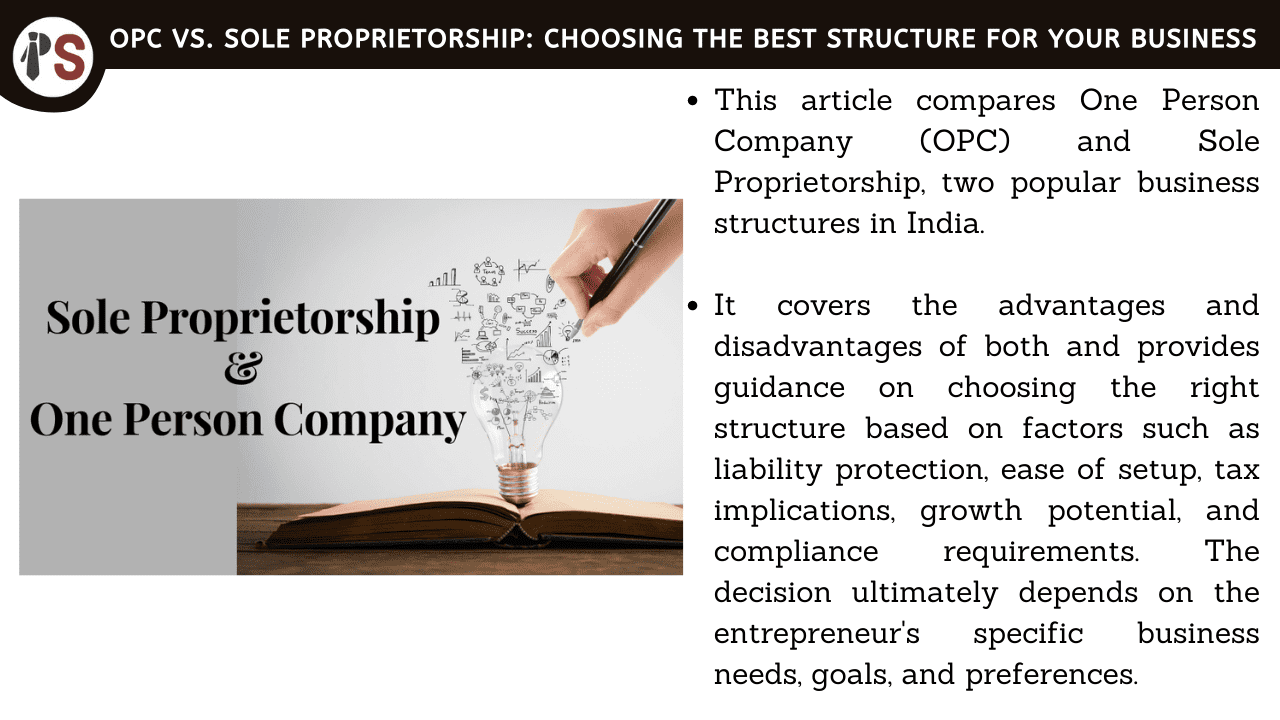
As an entrepreneur looking to start your own business, you have various options to choose from when it comes to the legal structure of your business. In India, two popular options for small business owners are the One Person Company (OPC) and Sole Proprietorship. Understanding the key differences between these two structures can help you make an informed decision about which one is best for your business. In this blog post, we will explore the features, advantages, and disadvantages of both OPCs and Sole Proprietorships, and provide some guidance on how to choose the right structure for your business.
An OPC is a relatively new concept in India, introduced by the Companies Act, 2013. It allows a single individual to establish a company without the need for any additional shareholders. This structure provides the benefits of a private limited company while still being a simple and flexible option for solo entrepreneurs.
Limited Liability: One of the main advantages of an OPC is that it provides limited liability protection to the owner. This means that the personal assets of the owner are separate from the company's assets, and in case of any legal or financial issues, the owner's personal assets are not at risk.
Separate Legal Entity: An OPC is considered a separate legal entity, distinct from its owner. This gives the company a professional image and makes it easier to enter into contracts and agreements with other parties.
Ease of Compliance: An OPC is subject to fewer compliances and regulatory requirements than a private limited company, making it relatively easier to manage.
Continuity of Business: In case of the demise of the sole owner, an OPC can nominate a successor, ensuring the continuity of the business.
Higher Setup and Compliance Costs: The cost of setting up an OPC and maintaining it is higher than that of a sole proprietorship, mainly due to the registration fees and compliance costs.
Limited Growth Potential: An OPC cannot have more than one shareholder, which may limit its growth potential and access to external funding.
To learn more about OPCs and how to set one up, visit https://professionalsaathi.com/services/one-person-company.
A Sole Proprietorship is the simplest and most common form of business structure in India. It is owned, managed, and controlled by a single individual, who is responsible for all aspects of the business, including its liabilities.
Ease of Setup and Management: Setting up a sole proprietorship is relatively easy and requires minimal documentation and formalities. The owner has complete control over the business and its operations, allowing for greater flexibility in decision-making.
Lower Costs: A sole proprietorship is generally less expensive to set up and maintain than an OPC, as there are no registration fees and fewer compliance requirements.
Tax Benefits: Sole proprietors are taxed at individual income tax rates, which can be lower than the corporate tax rates applicable to OPCs and other types of companies.
Unlimited Liability: The owner of a sole proprietorship has unlimited liability, meaning that their personal assets can be used to settle any debts or liabilities incurred by the business.
Lack of Continuity: A sole proprietorship ceases to exist upon the death or incapacity of the owner, which may lead to the discontinuation of the business.
Limited Growth Potential: Sole proprietorships often face challenges in raising capital and attracting investors, as they lack the credibility and formal structure associated with other types of business entities.
When deciding between an OPC and a sole proprietorship, consider the following factors:
Liability Protection: If limited liability is important to you, an OPC may be a better choice, as it offers protection for your personal assets.
Ease of Setup and Costs: If you're looking for a simpler and more cost-effective business structure, a sole proprietorship may be a better fit.
Tax Implications: Consider the potential tax benefits and liabilities associated with each structure, and consult a tax professional if necessary.
Growth Potential: If you plan to expand your business and attract investors or partners in the future, an OPC may offer more opportunities for growth.
Compliance Requirements: Evaluate the compliance and regulatory requirements for each structure and determine whether you have the resources and time to manage them.
In conclusion, both OPCs and sole proprietorships have their advantages and disadvantages. Your choice will depend on your specific business needs, goals, and preferences. Be sure to carefully consider the pros and cons of each structure before making your decision. If you need assistance setting up an OPC, visit https://professionalsaathi.com/services/one-person-company for more information and professional guidance.
Remember, the right business structure can greatly impact the success and sustainability of your venture. So, take your time and make an informed decision that best suits your unique business needs.
At Professional Saathi, we offer a range of business consultancy services that help businesses improve their performance, achieve growth, and overcome challenges.
Copyright 2026 © Created By KTPG PROFESSIONAL SAATHI CORPORATE CONSULTANT PRIVATE LIMITED, All Rights Reserved.
Leave Your Comment